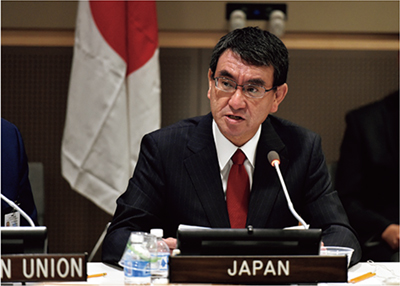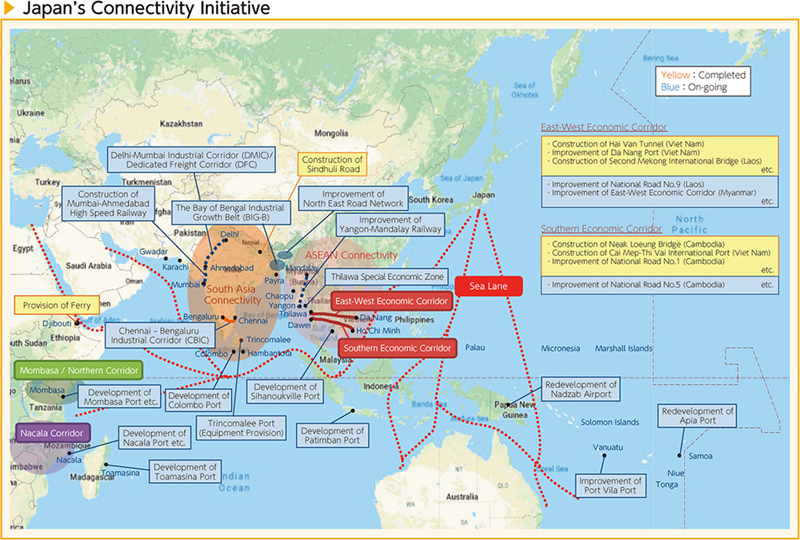Diplomatic Bluebook 2018
Chapter 2
Japan's Foreign Policy that Takes a Panoramic Perspective of the World Map
Section 2 Japan's International Cooperation(Development Cooperation and Response to Global Issues)
Overview
(Development Cooperation Charter and Strategic Use of ODA)
More than sixty years have passed since Japan started its Official Development Assistance (ODA)1 in 1954. Japan's development cooperation policy including ODA has greatly contributed to securing the peace, stability, and prosperity of the international community and consequently the national interests of Japan for many years.
On the other hand, the international situation with regard to development cooperation is at a major crossroad. The world is facing more diverse and complex challenges transcending national borders as the world becomes increasingly globalized. Furthermore, considering the growing roles of recent non-ODA public/private funds and support from emerging countries, it is important to collect wisdom and actions of developing countries as well as developed countries and various resources apart from the central government (corporations, local governments, NGOs, etc.). In this new era, it is essential for ensuring Japan's national interests that Japan should consider development cooperation as a part of “Proactive Contribution to Peace” based on the principle of international cooperation, and strategically use ODA to address development and human rights issues while continuing to adhere to the course that Japan has taken to date as a peace-loving nation. Under the Development Cooperation Charter established based on this recognition (decided by the Cabinet in February 2015), there is a need to steadily implement the “Sustainable Development Goals (SDGs),” the development goals for the whole international community, including developed countries. It is also vital to establish anew a fully adequate system in order to secure the safety of Japanese people engaged in international cooperation abroad.
For Japan, development cooperation is one of the most important diplomatic tools and is essential for its proactive contribution to peace, stability, and prosperity of the international community, from humanitarian assistance such as initiatives to resolve issues concerning refugees in the Middle East and Africa, emergency assistance in response to disasters, to economic and social development in developing countries such as infrastructure development and human resource development. In particular, the “Free and Open Indo-Pacific Strategy” set out by Prime Minister Abe in August 2016 places emphasis on support that contributes to strengthening the rule of law at sea, as well as enhancing connectivity through means such as the development of quality infrastructure, in order to achieve economic prosperity for the region. In developing quality infrastructure, it is vital to secure various elements including economic efficiency in view of life-cycle costs and responsible financing for recipient countries which are included in the G7 Ise-Shima Principles for Promoting Quality Infrastructure Investment adopted at the G7 Ise-Shima Summit held in May 2016, as well as openness and transparency of infrastructure, and promote their international standardization. Japan will continue to contribute to peace and prosperity of the international community while actively making use of ODA and developing quality infrastructure.
 Foreign Minister Kono attending the side event on promoting investment in quality infrastructure, at the 72nd UN General Assembly (September 19, New York, U.S.)
Foreign Minister Kono attending the side event on promoting investment in quality infrastructure, at the 72nd UN General Assembly (September 19, New York, U.S.)
The revitalization of Japan's economy through the growth of developing countries and its growth alongside these countries is also an important issue for Japan's national interest. As described in the “Growth Strategy 2017” (revised in June 2017) and “Infrastructure Systems Export Strategy” (revised in May 2016), it is necessary to utilize ODA strategically in order to further promote the overseas expansion of Japanese companies.
Such efforts by Japan have won both high praise and trust from the international community. It is important that Japan continues and strengthens the efforts in the future so that Japan can lead the international community as a major responsible country in the world and ensure the international environment and order in line with Japan's national interests.
- 1 For details on Japan's international cooperation, refer to “Japan's International Cooperation” of White Paper on Development Cooperation.
(Response to Global Issues)
While globalization has resulted in dramatic economic and social development worldwide, it has also brought about diverse threats to human security. The threats include conflict, terrorism, disasters, global environmental issues such as climate change, global health issues including infectious diseases, human trafficking, refugee issues, labor issues, and economic crises. These global issues cannot be addressed by one country alone. The international community must work together based on the concept of human security. Against this background, new frameworks aimed at countering the various global issues were formulated, including the 2030 Agenda for Sustainable Development, the Sendai Framework for Disaster Risk Reduction 2015-2030, and the Paris Agreement. In 2017, Japan accelerated the implementation of these frameworks, and at the same time, disseminated information about Japan's initiatives through the UN High-level Political Forum (HLPF) and the Universal Health Coverage (UHC)2 Forum 2017 (See Special Feature “UHC Forum 2017”).
With the aim of implementing the Sustainable Development Goals (SDGs) that were adopted in September 2015 as international goals with the year 2030 as the target deadline, the SDGs Promotion Headquarters was established within the Cabinet in May 2016, headed by the Prime Minister and comprising of all Ministers as members. Japan's guidelines toward the achievement of the SDGs (SDGs Implementation Guiding Principles) were established in December the same year. At the fourth meeting of the SDGs Promotion Headquarters held in December 2017, the SDGs Action Plan 2018 was decided. This Action Plan incorporated the key initiatives that the Government of Japan aims to advance in an integrated manner. Overseas as well, Foreign Minister Kishida attended the UN High-level Political Forum (HLPF) on Sustainable Development in July 2017, where he put out messages about Japan's SDGs initiatives through public-private partnership as well as international cooperation relating to the SDGs (See Special Feature “Sustainable Development Goals (SDGs) -Cooperation with Diverse Stakeholders-”).
In the area of disaster risk reduction, which is essential to realize sustainable development, the Sendai Framework for Disaster Risk Reduction 2015-2030 was adopted at the Third United Nations World Conference on Disaster Risk Reduction held in Sendai in March 2015, and steady efforts are underway to bring disaster risk reduction into the mainstream. The enactment of “World Tsunami Awareness Day” (November 5), adopted at the UN General Assembly in December 2015, was followed by the implementation of related activities in 2017 including events to raise awareness about the “World Tsunami Awareness Day” in Japan and around the world, as well as tsunami evacuation drills.
In the area of health, Japan contributed to the international efforts in addressing global health issues based on the “Basic Design for Peace and Health” formulated in September 2015 as its Global Health policy under the Development Cooperation Charter. The UHC Forum 2017 was convened in Tokyo in December 2017 to promote UHC, and the importance of promoting UHC, which also contributes to responding to public health emergencies such as infectious diseases, left a deep impression about Japan's leadership in this field on the international community.
In the area of climate change, the Paris Agreement was adopted at the 21st Session of the Conference of the Parties to the United Nations Framework Convention on Climate Change (COP21) held in France in December 2015. This Agreement is a fair and effective framework that provides for the submission of greenhouse gas emission reduction targets (nationally determined contribution) by each country independently, with no distinction between developing and developed countries, and for the implementation of measures toward the achievement of these targets. It entered into force in November 2016, and Japan ratified the Agreement in the same year. Negotiations are currently underway with the aim of adopting the relevant guidelines in 2018, and Japan participated actively in discussions to that end at the COP23 held in Germany in November 2017 as well as on other occasions.
Japan will continue to cooperate with the respective countries, international organizations, civil society, etc., under the Global Partnership, to promote human security and work actively toward the resolution of global issues.
Rapid changes in the Arctic environment as a result of global warming have brought about possibilities of new economic activities such as the use of the Northern Sea Route and the development of mineral and biological resources. On the other hand, there is growing concern over the Arctic environment in the international community, such as the impact on the lives of people in the Arctic including indigenous peoples, the importance of conserving the Arctic environment and sustainable development, and potential changes of the security environment.
Based on “Japan's Arctic Policy” adapted in 2015, Japan will ensure its strong presence on the issues over the Arctic by its contribution to the whole world, making full use of its strength in science and technology.
- 2 To endure affordable access to basic health services for all whenever they need them throughout their lives
(Science and Technology Diplomacy)
Science and technology constitute the foundational elements for peace and prosperity that support socioeconomic development, and play a vital role in security. In this regard, Japan's advanced science and technology attracts a high level of international interest and expectations. Japan, by promoting science and technology diplomacy, harnesses its unique strengths in science and technology to contribute to the development of science and technology at home and abroad, the promotion of relations with other countries, the peace and stability of the international community, and the resolution of global challenges. Japan is also putting effort into initiatives implemented through the activities of the Science and Technology Advisor to the Minister for Foreign Affairs.
